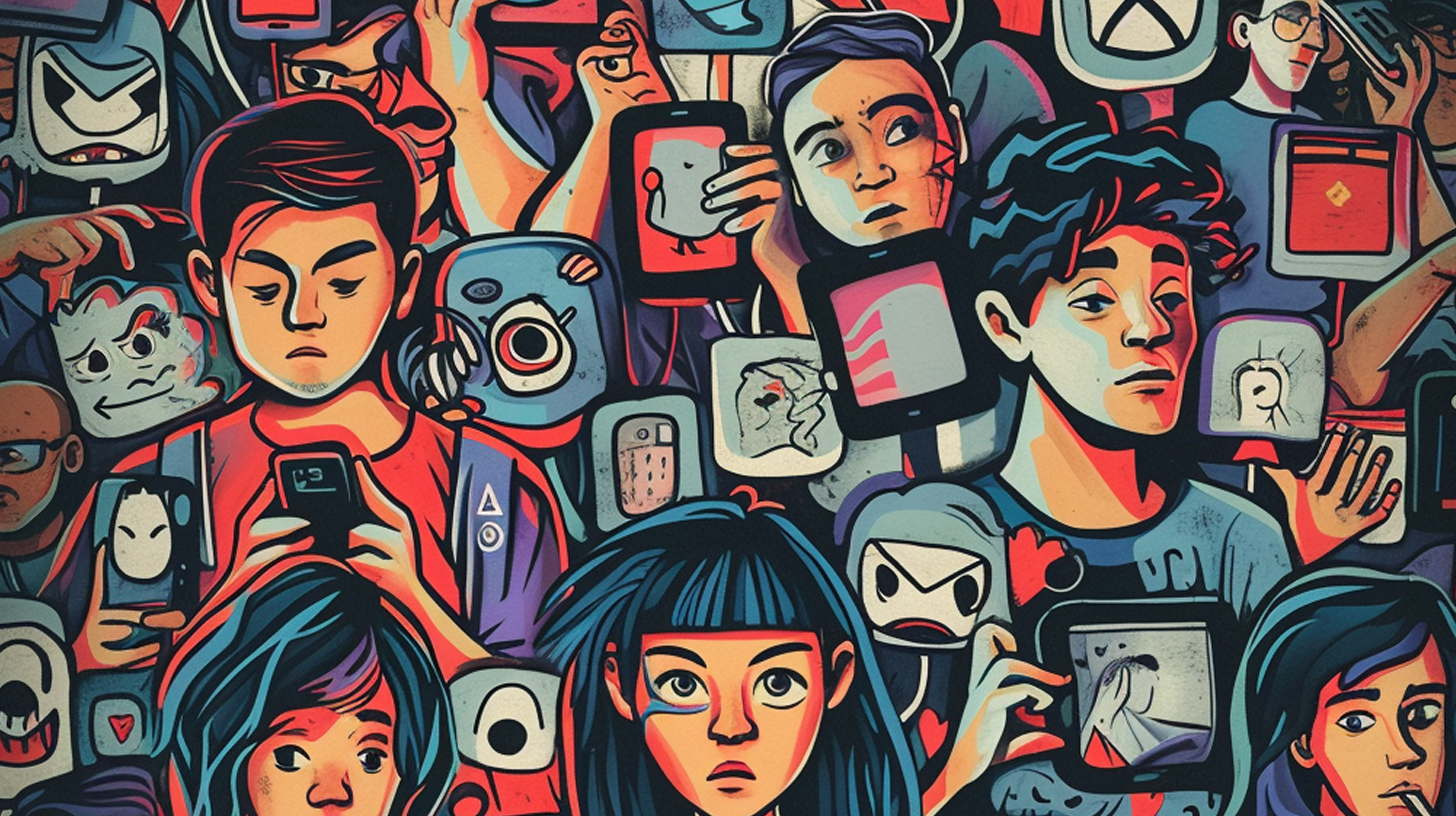The digital era has significantly transformed the way we form and maintain friendships. Social media platforms have expanded our ability to connect with people across vast distances, leading to the rise of virtual friendships. These online connections often begin through shared interests or mutual acquaintances, and can develop into meaningful relationships despite the lack of physical proximity.
Digital relationships have introduced new dynamics to friendship, allowing for constant communication and instant sharing of experiences. Social media friendship has redefined how we stay in touch, with likes, comments, and direct messages replacing traditional forms of correspondence. This shift has both positive and negative implications for the depth and quality of our connections.
While online friendships can provide support, companionship, and a sense of belonging, they also present challenges. The ease of connecting virtually may lead to a higher quantity of superficial relationships at the expense of deeper, more intimate friendships. Additionally, the curated nature of online personas can create unrealistic expectations and comparisons.
As we navigate this new landscape of friendship, it’s crucial to strike a balance between digital and in-person interactions. Recognizing the value of both online and offline connections can help us cultivate a diverse and fulfilling social network in the digital age.
The Impact of Social Media on Traditional Friendship Structures
Social media has fundamentally altered the landscape of friendship in the digital age. As platforms like Facebook, Instagram, and Twitter have become ubiquitous, they’ve reshaped how we form, maintain, and perceive friendships. One significant change is the expansion of our social circles; social media allows us to connect with a far larger number of people than traditional friendship structures permitted.
Digital communication has introduced new dynamics to friendships. While it enables constant connectivity, it can sometimes lead to shallow interactions. The ease of maintaining surface-level connections through likes and comments may come at the expense of deeper, more meaningful relationships.
The distinction between online and offline friendships has become increasingly blurred. Many relationships now exist in both spheres, with in-person interactions supplemented by digital communication. This hybrid model of friendship has become the norm for many, especially younger generations.
Social media has also transformed how we perceive our friendships. The curated nature of online profiles can create unrealistic expectations and foster feelings of inadequacy or FOMO (fear of missing out). However, it also provides opportunities for people to find like-minded individuals and form communities based on shared interests, transcending geographical limitations.
While social media has undoubtedly changed friendship structures, it’s important to recognize both its benefits and drawbacks. As we navigate this new landscape, finding a balance between online connections and traditional face-to-face interactions remains crucial for maintaining healthy, fulfilling relationships.
Benefits of Maintaining Friendships through Social Media
Social media platforms have revolutionized the way we maintain friendships, offering numerous benefits for those seeking to stay connected in our increasingly globalized world. One of the most significant advantages is the ability to nurture long-distance friendships with ease. Through regular updates, messages, and video calls, friends separated by vast distances can remain an integral part of each other’s lives.
These platforms also provide an excellent opportunity for reconnecting with old friends. With just a few clicks, you can find and reach out to childhood companions or former colleagues, rekindling relationships that may have otherwise faded over time. This reconnection often leads to expanded social networks, as you discover mutual connections and form new friendships through these rediscovered relationships.
The instant communication facilitated by social media allows for real-time sharing of experiences, thoughts, and emotions. Whether it’s celebrating a milestone or seeking support during challenging times, friends can be there for each other virtually, bridging the gap created by physical distance.
Moreover, social media enables shared experiences online through features like collaborative playlists, virtual watch parties, or participating in trending challenges together. These shared activities help maintain a sense of closeness and create new memories, even when friends are physically apart.
In conclusion, social media has become an invaluable tool for maintaining friendships, offering a range of benefits that help us stay connected, share experiences, and nurture relationships regardless of geographical boundaries.
Challenges and Pitfalls of Social Media Friendships
Social media friendships, while offering unprecedented connectivity, come with their own set of challenges and pitfalls. Digital drama can erupt quickly, fueled by misinterpretations of tone and intent in text-based communications. Online misunderstandings are common, as nuances of facial expressions and body language are lost in virtual interactions.
Social comparison is intensified on these platforms, where users often present curated versions of their lives, leading to feelings of inadequacy among their peers. This constant exposure to others’ highlight reels can trigger FOMO (Fear of Missing Out), causing anxiety and dissatisfaction with one’s own experiences.
Cyberbullying remains a significant concern, with the anonymity and distance provided by social media sometimes emboldening individuals to engage in harmful behavior. The ease of spreading rumors or hurtful comments can have devastating effects on individuals’ mental health and social standing.
Moreover, the nature of social media often encourages superficial connections. The quantity of “friends” or followers can overshadow the quality of relationships, leading to a false sense of social support. Users may find themselves surrounded by numerous online acquaintances but lacking deep, meaningful friendships.
While social media friendships offer many benefits, it’s crucial to navigate these digital waters with awareness of these potential pitfalls, striving for authentic connections and maintaining perspective on the realities behind online personas.
Strategies for Cultivating Authentic Friendships in the Digital Age
In the digital age, cultivating authentic friendships requires a thoughtful approach to balance online and offline interactions. While social media platforms offer unprecedented connectivity, they can also create a false sense of intimacy. To foster genuine connections, it’s crucial to prioritize face-to-face interactions whenever possible, complementing digital communication with real-world experiences.
Setting boundaries is essential in maintaining healthy relationships. This includes being mindful of screen time and establishing tech-free zones or periods. Implementing regular digital detoxes can help reset your perspective and remind you of the value of in-person connections.
Meaningful engagement is key to deepening friendships. Instead of surface-level interactions like quick likes or comments, focus on having substantive conversations and showing genuine interest in others’ lives. This approach translates well both online and offline, creating a foundation for stronger bonds.
Authentic self-presentation is vital in building trust and fostering real connections. While it’s tempting to curate a perfect online image, being honest about your experiences, thoughts, and feelings allows for more genuine interactions. This authenticity invites others to reciprocate, leading to more meaningful friendships.
By implementing these strategies, you can navigate the digital landscape while cultivating authentic, lasting friendships that enrich your life both online and offline.
The Role of Social Media Platforms in Shaping Friendship Dynamics
Social media platforms have significantly transformed the way we form, maintain, and perceive friendships in the digital age. Each platform offers unique features that influence our social interactions and connections.
Facebook, with its “Friends” system, allows users to curate a network of acquaintances, old classmates, and close friends. The platform’s events and groups features facilitate both online and offline interactions, strengthening existing bonds and creating new ones.
Instagram’s follower-based model focuses more on visual storytelling, allowing users to share snippets of their lives through photos and short videos. The platform’s Stories and Direct Message features encourage more frequent, casual interactions between followers.
Twitter’s fast-paced environment fosters connections based on shared interests and real-time conversations. Users can build diverse networks of like-minded individuals, thought leaders, and even celebrities, transcending geographical boundaries.
LinkedIn, while primarily professional, blurs the line between work connections and friendships. Its networking features allow users to maintain relationships with colleagues and industry peers, often leading to meaningful professional friendships.
Each platform’s specific friendship features, such as Facebook’s friendship anniversary reminders or Instagram’s Close Friends list, further shape how we interact with and prioritize our online connections. As these platforms continue to evolve, so too will the dynamics of digital friendships, presenting both challenges and opportunities for maintaining meaningful relationships in the virtual world.
Maintaining Privacy and Trust in Social Media Friendships
In the digital age, maintaining privacy and trust in social media friendships is crucial for protecting personal information and fostering genuine connections. Start by familiarizing yourself with online privacy settings on each platform you use. These settings allow you to control who sees your posts, personal details, and friend list. Establish clear sharing boundaries by deciding what information you’re comfortable revealing online and to whom. This selective sharing approach helps maintain a balance between openness and privacy.
Building digital trust is essential in online friendships. Be mindful of the content you share and how it might affect others. Avoid oversharing sensitive information about yourself or your friends, and always seek permission before posting photos or tagging others. Remember that once information is online, it can be challenging to completely remove it.
Protecting personal information extends beyond your own profile. Be cautious when participating in online quizzes or surveys that may collect data. Additionally, be wary of friend requests from unknown individuals, as these could be attempts to gain access to your personal information.
By implementing these practices, you can create a safer, more trustworthy social media environment that allows for meaningful connections while safeguarding your privacy.
The Future of Friendship: Emerging Technologies and Social Connections
As we venture further into the digital age, the landscape of friendship is undergoing a profound transformation. Emerging technologies are reshaping how we form, maintain, and experience social connections. Virtual reality (VR) is opening up new frontiers for long-distance friendships, allowing people to share immersive experiences despite physical separation. Friends can now explore virtual worlds together, attend concerts, or even collaborate on projects in shared digital spaces.
Artificial intelligence (AI) companions are also becoming increasingly sophisticated, offering emotional support and companionship to those who may feel isolated. While these AI friends cannot replace human connections, they can provide valuable social interaction and mental stimulation, particularly for individuals with limited mobility or social opportunities.
Augmented reality (AR) is blending the digital and physical worlds, enhancing our real-life interactions with friends. AR applications can overlay information about shared memories, interests, or even mood indicators during face-to-face meetings, potentially deepening our understanding and empathy towards one another.
The future of social networks is likely to be more immersive and interconnected. As technologies like brain-computer interfaces advance, we may see the emergence of thought-sharing platforms, allowing for unprecedented levels of emotional and intellectual connection.
However, as these technologies evolve, it’s crucial to consider the ethical implications and potential impacts on traditional forms of friendship. Balancing digital connections with meaningful in-person interactions will be key to maintaining healthy social relationships in this brave new world of evolving communication technologies.
Embracing the Best of Both Worlds in Modern Friendships
Modern friendships have evolved to encompass both digital connections and traditional face-to-face interactions. While technology has undoubtedly changed the landscape of how we form and maintain relationships, it’s clear that the core values of friendship remain unchanged. The key to thriving in this new era of social connections lies in striking a balance between online and offline interactions.
By embracing the convenience and reach of digital platforms, we can stay connected with friends across vast distances and time zones. These tools allow us to share moments, offer support, and maintain bonds that might otherwise fade due to physical separation. However, it’s equally important to recognize the irreplaceable value of in-person encounters. Face-to-face meetings foster deeper emotional connections, allow for more nuanced communication, and create shared experiences that strengthen the fabric of friendships.
As we move forward, it’s crucial to approach our friendships with intention and awareness. We should leverage technology to enhance our connections without letting it become a substitute for meaningful, real-world interactions. By doing so, we can cultivate rich, diverse friendships that blend the best of both digital and physical worlds, creating a support network that is both extensive and profound.
Ultimately, the future of friendship lies in our ability to adapt to new forms of communication while holding onto the timeless qualities that make friendships so valuable: trust, empathy, shared experiences, and genuine care for one another’s well-being.










